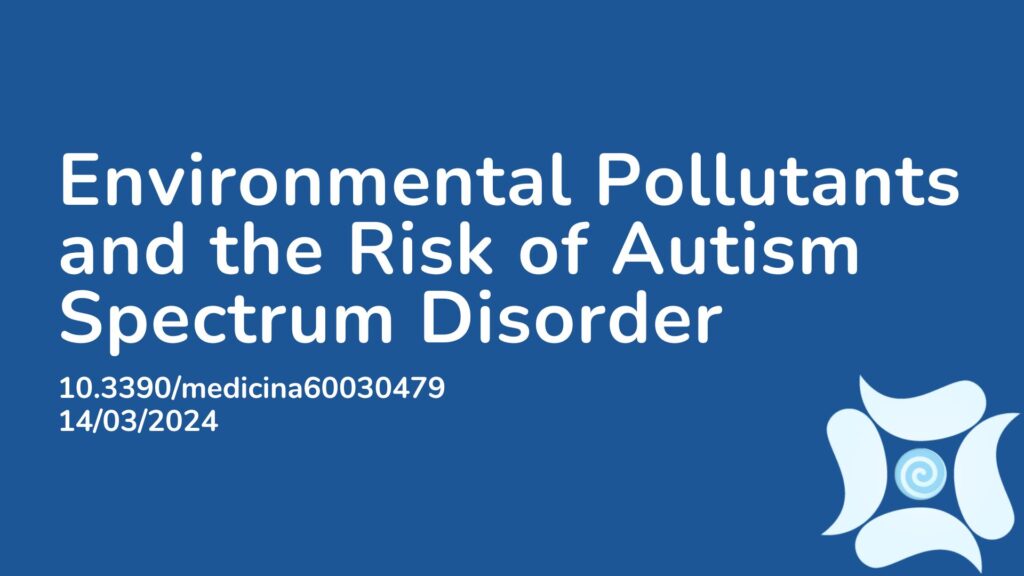Summary:
There has been increasing attention on exploring the impact of environmental pollutants on the etiology of Autism Spectrum Disorder (ASD). Studies have indicated that maternal exposure to pollutants like nitric oxide, fine particulate matter, pesticides, and solvents during pregnancy heightens the risk of ASD development in offspring. Prenatal exposure has been linked to adverse effects on cognitive function, social-emotional scores, memory, and motor skills in children. Experimental studies on rodents have further explored the effects of pesticides. Exposure to chlorpyrifos during prenatal stages has shown effects on sociability and delayed motor skill development resembling ASD-like behaviors. Similarly, exposure to glyphosate during critical developmental periods has been linked to neurobiological modifications and behavioral shifts akin to those observed in ASD.The underlying mechanism of pesticide effects may involve the generation of reactive oxygen species in brain regions involved in behavior regulation. Recent research has also highlighted the role of the gut-brain axis (GBA) in ASD. The GBA, a communication system between the gut and the brain, involves the intestinal microbiota, which plays a crucial role in various bodily functions. Children with ASD often exhibit gastrointestinal disorders, which may exacerbate behavioral symptoms. Certain pesticides can disrupt the gastrointestinal system and alter the composition of the gut microbiota. Glyphosate, in particular, can affect the microbiota by inhibiting the production of essential amino acids. Moreover, pesticides have the potential to compromise the integrity of the intestinal barrier. Given the complexity of ASD and the variability in research findings, there is an urgent need for expanded research efforts to elucidate the potential association between pesticides and ASD. This study aims to assess whether environmental pesticide exposure correlates with an elevated risk of ASD development over a comprehensive 21-year timeframe among individuals residing in regions characterized by intense agricultural activity. The researchers analyzed data from 2,821 individuals diagnosed with ASD living in regions of both high and low pesticide exposure in southern Spain. The findings revealed a higher prevalence of ASD in areas with elevated pesticide usage compared to those with lower usage. In conclusion, the study suggests a potential association between increased environmental pesticide exposure and the prevalence of ASD.
Abstract:
Background and Objectives: Autism spectrum disorder (ASD) is a neurodevelopmental condition characterized by challenges in communication, social interactions, and repetitive behaviors. Although the factors that influence the development of this condition are unknown, certain chemical compounds such as pesticides have been proposed as possible contributors. Due to the lack of an established causal link between pesticide exposure and ASD, this study aimed to evaluate this potential association.
Materials and Methods: A case-control study was carried out to ascertain the prevalence and risk associated with ASD in relation to pesticide exposure over a 21-year study period (2000–2021).
Results: We included 2821 individuals diagnosed with ASD residing in areas of both high and low pesticide exposure in southern Spain. There was a rise in the ASD prevalence rate in regions with elevated pesticide use when compared to regions with low use [odds ratio (OR): 1.34, 95% confidence interval (CI), (1.24–1.44)]. Notably, men had the highest likelihood, with an OR: 1.42, 95% CI, (1.30–1.55). Furthermore, after performing multiple binary logistic regression adjusted for age, sex, and geographical area, males exhibited a higher likelihood compared to females [OR: 2.41, 95% CI, (2.21–2.62)].
Conclusions: Overall, this research suggests a connection between heightened environmental pesticide exposure due to increased agricultural use and autism.
Article Publication Date: 14/03/2024
DOI: 10.3390/medicina60030479



